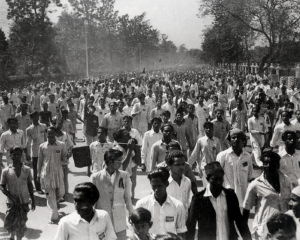On 17 November 1999, 21st of February was declared as World Mother Language Day by United Nations Educational Scientific and Cultural Organization and since the year 2000, this day is celebrated in the UN members countries. This day is also an annual reminder of the importance of mother language and its teaching on the individuals.
How did the World Mother Language Day come up?
The country, which is today known as the People’s Republic of Bangladesh, has become an independent country on December 16 1971, separating from India. Before this, Bangladeshi people who opposed the Urdu which was forced instead of Bengali ( or Bengali language) protested this decision. Many people lost their lives during these protests. Because of this, regarding February 21, 1952, which is the date of the protests, 21st of February has been declared as ‘’Language Movement Day’’ in Bangladesh. Today, more than 210 million people speak Bengali as their mother or second language. (1)
Mother language is important!

We hear our mother language before we are born. That is the first instrument that introduces us to the outside world. The first sound. Wherever you are in the World, it takes the air, the water and the livelihood of that place and brings them to you. For some, the mother language starts with ‘’Merhaba’’*, for some with ‘’Hallo” *. Objects and sounds match as we grow up without us realizing, the World around us gains meaning.
 This meaning is shaped with the contribution of thousands of years of culture and countless people. That is the reason each language expresses itself differently. Every child that comes to World is also a mirror which gives a new meaning to the mother language. For he/ she is the first person to experience the world through his/her eyes and although the interaction is inevitable, he/she puts his/her thoughts in what is happening around him/her. And they express it with their mother language.
This meaning is shaped with the contribution of thousands of years of culture and countless people. That is the reason each language expresses itself differently. Every child that comes to World is also a mirror which gives a new meaning to the mother language. For he/ she is the first person to experience the world through his/her eyes and although the interaction is inevitable, he/she puts his/her thoughts in what is happening around him/her. And they express it with their mother language.
Knowing a language is not enough for some jokes!

We all know the little jokes we slip into our conversations in our daily lives. We make jokes sometimes to lighten up the mood, sometimes to let ourselves go. This doesn’t make it complicated between people who share the same mother language. However, sometimes for people who know two or more languages, there might be a disconnection in the communication when it comes to telling jokes. This might be due to neither with the vocabulary knowledge nor the shortage of grammar of the person you talk to. Jokes are not solely composed of wordplays. If they were, we could explain them to an extent. We can, however, explain this subject with the fact that jokes indicate a common and great cultural background. When you tell a joke to a person who is learning your mother language as a second language, you may not get a reaction whereas someone with the same mother language as you may burst into laughter. This is directly related to the message behind the joke. The punchline of the joke may remind of a funny moment on tv happened years ago. At this point, even though you explain it, they may not strike a chord.
My mother language is a part of my identity!
 The effect of events that happened way before we can remember is an undeniable fact. Our mother language can be an example. As we grow up, our mother language is always around us and we interact with it. Just like people from different regions in Turkey speaking in different dialects, the way we express ourselves, the words we prefer, our speaking speed, all of these are changes our mother language adds to us by integrating with the place it is spoken in. Our gestures and attitudes are also affected by our mother language. When we speak a second language, we come to realize that we are expressing ourselves differently. The language we are speaking is no longer the only thing thang changes, our demeanour changes too. With every language we learn, another us comes to light. And in this way, our mother language becomes the most impactful language.
The effect of events that happened way before we can remember is an undeniable fact. Our mother language can be an example. As we grow up, our mother language is always around us and we interact with it. Just like people from different regions in Turkey speaking in different dialects, the way we express ourselves, the words we prefer, our speaking speed, all of these are changes our mother language adds to us by integrating with the place it is spoken in. Our gestures and attitudes are also affected by our mother language. When we speak a second language, we come to realize that we are expressing ourselves differently. The language we are speaking is no longer the only thing thang changes, our demeanour changes too. With every language we learn, another us comes to light. And in this way, our mother language becomes the most impactful language.
We celebrate you on the very first language that nurtured you, Happy World Mother Language Day!
For Turkish learners
You can read and listen this article in Turkish
*Merhaba means ‘’Hello ‘’ in Turkish.
* Hallo means ‘’ Hello’’ in German.
Sources: (1) https://www.britannica.com/topic/Bengali-language
Translated by: Esra Nur ELMAS
February, 2020


